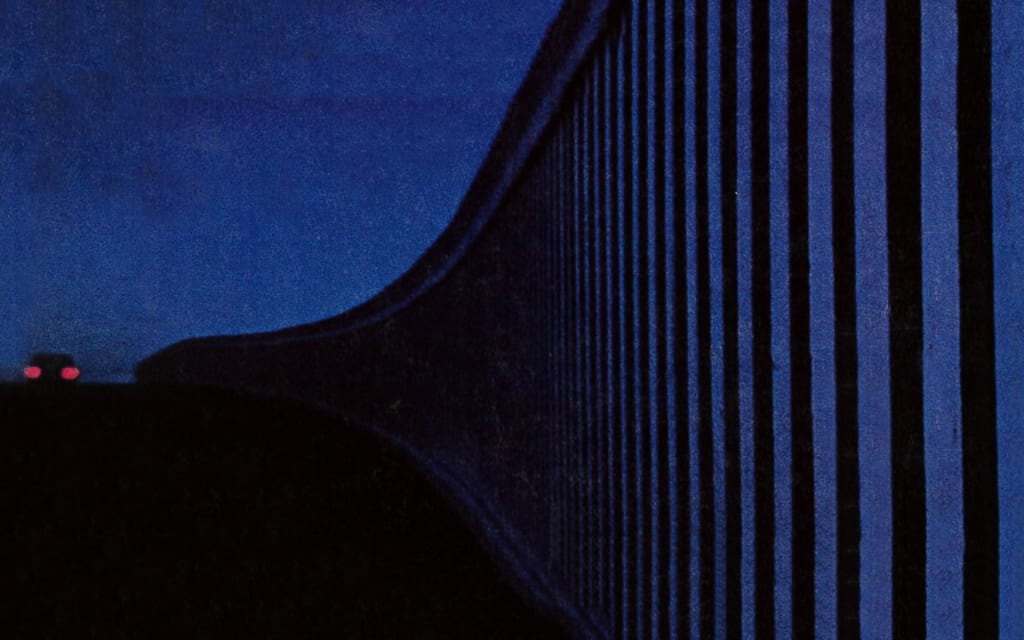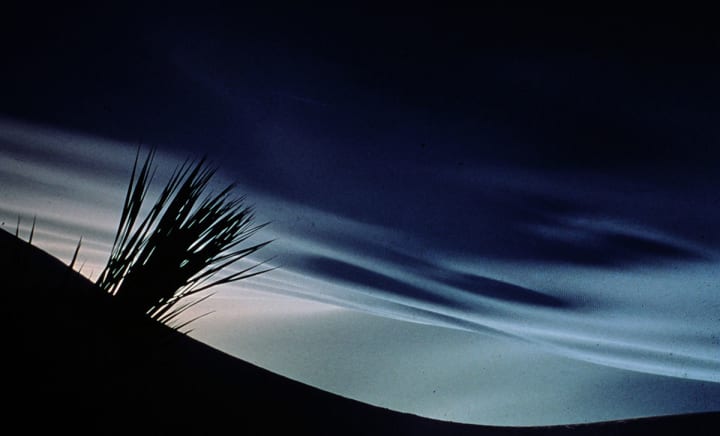Alone, In the Car, And In the Dark
A driver encounters a rare and special mammal on a cold winter night.

Rare and Special Mammals
The impact pinches the car doors shut. The dome light flickers eight times blue, then eight times red. Small processors work to determine if the cabin has held its form.
Four seatbelt straps combine at the driver’s waist. Her head lies on her right shoulder. The car estimates that it will take another fifteen minutes for her to regain consciousness. Its programming is to wait for her appraisal of the damage. It generously routes power from unnecessary systems—tire-pressure sensors, headlight dimmers, parking assist, and anti-lock braking—to climate control and seat warmers.
Outdoor temperature reads 23 degrees Fahrenheit. Seven minutes have passed since impact. Sensors pinned to the corners of the hood detect a level of submersion in two feet of dense snow. Propulsion systems are non-operational. Headlights functional. SOS brights have been engaged for three minutes. The impact has pinched the car doors shut.
She hasn’t moved. It came down the hill with the help of a separate system that kept the engines cool, devoting primary resources to traction and power. The car’s destruction was quick and hushed, like the sudden flitting of a butterfly over an empty field: neat and circular, only erratic upon closer inspection. Airborne, the lightweight shell took in bits of everything around it, brushing the open mouth of the ravine and grazing the profiles of dead trees.
Interior temperature readings are unavailable. Secondary conduit established. Interior temperature is 68 degrees Fahrenheit. Driver remains unconscious. Rear wheel drive is inoperable. Unmanned self-extraction determined impossible. Pinnacle Impact Crumple Zone™ has been engaged to save driver’s life. Diverting self-extraction reserve power to heating system. Preparing to re-run catastrophic event sequence for potential rescue nearby. Scanning for signal. Running driver survival probabilities. Lowering. The impact has pinched the car doors shut.
It’s lodged in the snow like a blade. It’s silver. Patience and hunger have made me small and opened my ears like satellite dishes. They say birds will bring me food when I’m hungry, that bats will guide me in the dark, that larger creatures won’t harm me when I share their nests. Though just stories, they hardly distort the truth that being capable of little, I’ve made a living from the good that’s come to me unsought.
Headlights are functional. SOS hazard lights have been engaged for the past 12 minutes. The impact has pinched the car doors shut. The car estimates that it will have to wait three minutes for the driver to regain consciousness. The Failsafe Protocol will be made active upon her waking. Beginning preliminary scans of the surrounding area.
If the impact pinched the doors shut, I know the computer system will go into a failsafe protocol. Based on the temperature, the car will divert structural integrity from the head-on crumple zone to keep the cabin intact for heating and insulation. After assessing the crash, broadcasting distress signals, and keeping passengers warm long enough to wake up, it will activate hydraulic pumps to open the shatterproof windshield. With the doors pinched shut, the driver will be allowed to escape before the computer permanently shuts down. There were once many open car shells along the roadside. At night, I used to hear people moving by grasping tree trunks in the dark, draining the shells of fuel and electricity, staying for a while to lick them clean.
At the window, I can see small drops of condensation forming at the corners. The environmental seals are deteriorating in preparation for the failsafe protocol. I can see the driver beginning to stir. She moves her knee slightly to the right. I get closer to the glass so I can understand it. I want to test its realness, cold and smooth. It smells like pollen and the wind. I know it came from somewhere warmer. I circle to the back. The metal pops as it cools. Something in the trunk smells faintly living. Beyond burning, I can smell sunlight.
Circuits fire. Driver conscious. Safe protocol commence. She thinks that there don’t seem to be enough words there. The vents put out a low and constant whispering. The heat has dried blood to her forehead.
Something outside the window darts away before she can process the image. After a while, her brain begins to function slowly, in starts and stops, turning and jamming gears. It had big, yellow eyes. Breedless, a skinny dog. Strands of hair stick to her head. A coyote or something. All is sore. Her bones have been shunted out of place and brought back in the same instant.
I’m beyond my ability to panic. Panic was a warm phase that the car let me sleep through. I want to stay here.

Countdown for Failsafe Protocol to Commence.
She remembers the clean shuffling of conductive cards in the system’s memory, letting her know that the code on the slides was active and good. The security protocol was unzipped and collated like floating strands of DNA. She waited, configuring the car to be cooperative.
She had doubts about the plan to steal it, but when she decided something her will never changed. It stayed frozen and locked away in immovable stasis. A few words from a shabby traveler, that bands west of the pass had simply disappeared, reminded her of the year she spent out there. It used to be like an empire, he said.
She had laughed in their bunkers behind the weighty latches of old truck doors. She felt secure and trusted, in the even heat of their kerosene fires. She didn’t plan on hearing from them after she left, but now the silence and static became apparent. Word of mouth once floated into the city so easily that it was hard to imagine that network disassembled, leaving unsaid goodwill rotating slowly in the air. You don’t know how empty, he said.
In spite of everything she did to cut herself off, she hoped somehow to hear of their fate. Those chance remarks reminded her that like ghosts, the deeply wronged never need to say anything, and are made more menacing by their silent reappearance in some secluded place, at some unguarded hour.
With a high-pitched vibration, a thought was decisively executed in her head. She would return as if she never left, as if she never slipped away in the dark. She would bring gifts to the people she stole so much from and stay in the even warmth of their gratitude. What she brought them would bend her return into a shape that had a sense of justice, as if everything that happened was a part of a plan, in the end.
The decision was separated from her primary reality, which managed concerns like whether she could actually find anyone, or if there would be anyone left to find. She automatically went about her plan, ignoring a dim memory gradually rising to the surface of her mind—being desperate and cold with a dealer of an unknown fate circling closer in the dark. Her present resolve being too sharp, the memory came away like a dream.
She got the program modification slides from a man who made candles. He furnished all of the lighting at one of the rest-Bars in the city. Perfectly framed amongst his wares, he kept a table on a raised platform that in other times must have been a stage. He smelled of fat and soap. His skin had a waxy sheen.
He said she must be desperate. He took account of known facts: she was small, her hair was thin, and she had a darting intensity in her eyes. That wasn’t what made her suspicious. There were enough unpleasant upbringings to go around over the last however many years to account for her and whoever else you wanted to look at closely. But the fullness of the flesh around her elbows showed she got enough food to eat now, so her reasons for leaving were a mystery.
If you go through with this, I’m going to need to give you a weapon, he said. She knew this would take work denying. She told him she wanted to appear as harmless as possible in any encounter she had. The real idea was to have no encounters at all. They exchanged warnings about the owners of the sophisticated car. She said that there was a limit to how far they could follow her. She just had to get to that point faster than they did.
And what you’re carrying to the far side of our home expanse, he asked. She remembered the silence that followed. He was close to a friend. She debated whether to use that silence to express her natural distrust or to protect him from any consequences. He stayed quiet and took a deep breath.
Giving her the weapon would mean that it’d be lost. He knew that every so often a film would grow over city dwellers’ eyes; they’d steal something and run from wherever they were, looking for another place that mostly existed within their minds. He wondered if these states were caused by some kind of error, one that, upon realizing itself, launched into the empty world for discreet deletion. It was possible it was contagious. Unlikely, but seeing it so close was alarming.
He never shared with anyone the particular thrill he felt in inventory. It was security measured out in tidy rows, like grids of canned food stacked waist-high, or a bouquet of gun barrels. There was value in knowing what you had—and what others had, too. His whole life was based around this. You could see what people risked in what they did, and then take your own risks accordingly. She may have kept quiet about what she was carrying for fear that he would try to take it from her. It was easier for him to do nothing and let the whole thing follow its course, to disappear from his world, quick and instantaneous, without leaving any kind of wound.

The strip of lights that ran along the driver’s window turned green with a high whine. The door flexed open. She stopped shivering.
She leaned back in the seat. Come on, baby. She whispered. The words seemed to loosen everything. The engine drew a big breath through open scoops on either side of the hood.
Even running on Hush-Idle™, it seemed to fly. No headlights on, darting around slick corners, leaving a trail of cold white vapor. Even though there was no use, she still rehearsed what to say to the guard at the entry checkpoint.
She was a member of the elite class taking a moonlit drive. She would begin powering up the main engine, audibly demonstrating her impatience.
Her clothes had small holes and large ones. They were big for her body. One of her knees was crowned by frayed fabric and appeared ghostly white. The size of her eyes was not distorted by the rearview mirror. They pushed forward, ash-colored, while her cheeks sloped down.
The road out of the city was straight and the engine gathered speed and determination. Her doubt was dissolved by the joy carried into her by a cable she imagined shot the machine’s electricity through her bones and into her own red blood. Insulating foam between the silver panels hushed the sudden astonishment of the guard, and the gate crumpled neatly under the clean drone of the engine. A light on the dashboard flashed red as traction sensors worked to compensate.
The car wound through empty plains for four hours before adjusting its oxygen intake at the foot of the mountains. Full color displays showed her the atmospheric pressure changing with elevation. Gradually, the bright graphic held her attention more than the rear-view monitor, which still picked up no sign of pursuit. The cabin bobbed over minor road debris. She fought off nerves by setting her brow and gritting her teeth, urging the engine faster.
The sun was coming up. The roads on this side of the pass were clear. Crinkled freight trucks and stomped-out passenger cars with sheaves of wiring had been dragged into the city’s crowded basin years before. She thought of the package she was carrying. She held a picture of her destination, fully populated, in her head. Sensors detected the weight and suspension responded to stabilize the trunk.
She remembered feeling the cargo the night before, hidden under stale-smelling blankets, leaning against her as she tried to sleep. As she wheeled into the pass and began to see the first signs of snow, the lumpy weight of it occupied her thoughts. She wasn’t thinking of the weather advisory withheld by dead satellites orbiting in the air. She drove intently, allowing the windshield wipers to automatically override as the snowflakes grew wider and decreased visibility.
She remembered driving the car as if it were a metal hand batting through the white cloud settling on the road. Then the present moment arrived. There was blood coming out of her head and the thick windshield was rising away.
From the brush I can see her struggling to undo seat buckles in the sudden cold. While her body does this, her mind is doing the best it can to understand that she did all of this for a burlap sack with some potatoes inside. She is subduing this knowledge and making amends with faint shadows of people she once knew.
They sit intact in the trunk, both silent and alive. There’s a faint dusting of earth to their smell. It’s a soft rumbling of nascent potential. I can see it faintly as the color blue, smoky and translucent. I can sense their spools of starch tightly wrapped inside their skins, a fully transferable supply of life.
I emerge near the back of the car. In a matter of days they will be frozen to stone, erased from the world by a lock so simple, it only requires a key. They weigh what was once called twenty-five pounds, but that knowledge was something fading away. That figure didn’t smell like decay, but like something that hadn’t known life or death at all, like a bottomless hole in the dark.
The coyote had paths through a field that it pressed down through regular travel in this area. It could smell when the grass silently grew them away. Nothing was so big that it couldn’t be swallowed up—a thought the coyote has had many times. It was sniffing the trunk when the hatch at the front of the car opened and the computer died.
The small woman who comes out, her bone-colored knees visible through threadbare fabric, has curled up and started to shake on the ground. Her mind races to finish a deeply personal sentence. She crawls forward and feels a pain in her head as if she’s been stricken blind. Her hands vibrate lightly, like the surface of a pond fluttered by the wings of a trapped fly.
The coyote has a smile that appears automatically when its mouth is open. It tries to look as harmless as possible.
About the Creator
Scot Braswell
Complains about the sad state of TV nature documentaries and finds himself pulled into the personal lives of feral cats instead. Bikes when it's warm out.






Comments
There are no comments for this story
Be the first to respond and start the conversation.